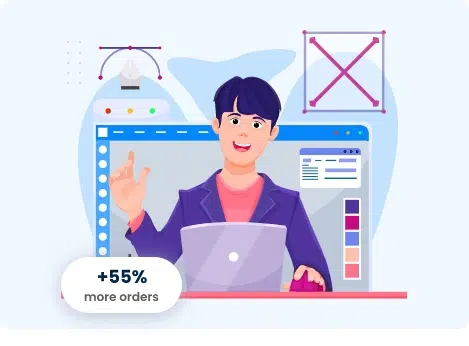Introduction
Firms are attempting to adjust to the “new normal,” while the online environment has accelerated in every sort of industry and commerce. Our minds have been programmed to believe that eCommerce is solely for B2C transactions; however, today, eCommerce is much more. As a result, B2B has begun to use the eCommerce system as well.
Expansion and cost-effectiveness are two frequent corporate objectives. B2B eCommerce aids firms in streamlining procedures while also ensuring that consumers and employees are satisfied. This is an incredible win for any company. The main distinction in B2B and B2C is that B2B comprises large purchases; firms don’t buy 1-2 things, but rather a massive volume of the same.
[elementor-template id=”40860″]
Producers and retailers are undergoing a significant transformation in their business practices. In a market where consumer demands are at an all-time peak, marketers have turned to B2B eCommerce to provide their purchasers with the same online buying capabilities and lightning-fast execution that they have grown to accept in their personal lives.
B2B eCommerce is a digital platform where a large number of buyers and sellers connect. As a result, both the supplier and the buyer are business partners rather than end-users.
Here are various ways reasons Why b2b buyers and sellers need an eCommerce website –
Your eCommerce site serves as a showroom–
Real-time business is more accessible with electronic catalogues. Possessing your product catalogues digital helps to reach out to a more significant number of clients, particularly those who have made the transition totally to the virtual environment. Customers can quickly find exactly what they’re seeking, thanks to eCommerce’s outstanding search feature addition, an. An online catalogue serves as a guideline for your business, allowing current and new customers to examine your goods and services from anywhere they have internet connectivity and a smartphone.
Cost-cutting-
Your online store helps save money by eliminating the need to print and circulate paper catalogues and the burden of data entry on your employees. The goal is to produce money generated if your team wasn’t spending hours entering data. Instead, you rely on their attracting customers, upsell to regular clients, and retain existing clients. B2B eCommerce software eliminates the need for duplicated customer order procedures by synchronising self-service order information to backend frameworks, such as your Enterprise Resource Planning (ERP). A B2B eCommerce platform also aids in easing the pressure on sales representatives.
Make contact with new customers-
An eCommerce business never closes, even in the dark of night or during holidays; it serves as your always-on salesperson, 24 hours a day, seven days a week. It acts as your best-appointed personnel, refusing to work on holidays or extra. You can’t constantly be available while your B2B firm is offline. It has a more significant impact on its performance as it becomes more automatic. The development of B2B eCommerce provides access to a broader range of B2B buyers who may be marketed worldwide, at any time and from any location. B2B eCommerce also allows for the creation of additional stores, territories, product catalogues, departments, etc. This makes B2B selling more accessible features than it has ever been. You can also use search engines to your advantage.
Inventory control is essential-
A B2B eCommerce store will generally have stock control integrated into it, which will enable you to keep track of inventory and update it instantly with each order. This function is beneficial to many suppliers because it allows them to keep track of their inventory more efficiently. This also makes the back-end crew’s arduous task of manually counting stocks easier.
[elementor-template id=”40866″]
Conclusion
The reasons stated above are some of them that necessities sellers to start with an eCommerce website. To enjoy such benefits, it is a must to have a website. More organisations are seeking for eCommerce solutions to make trading with large corporations more accessible and more transparent. An eCommerce website makes both buyers and sellers work more manageable and can reduce the amount of documentation supposed to hold track of orders, as all purchases made on your e-commerce store will do so.







